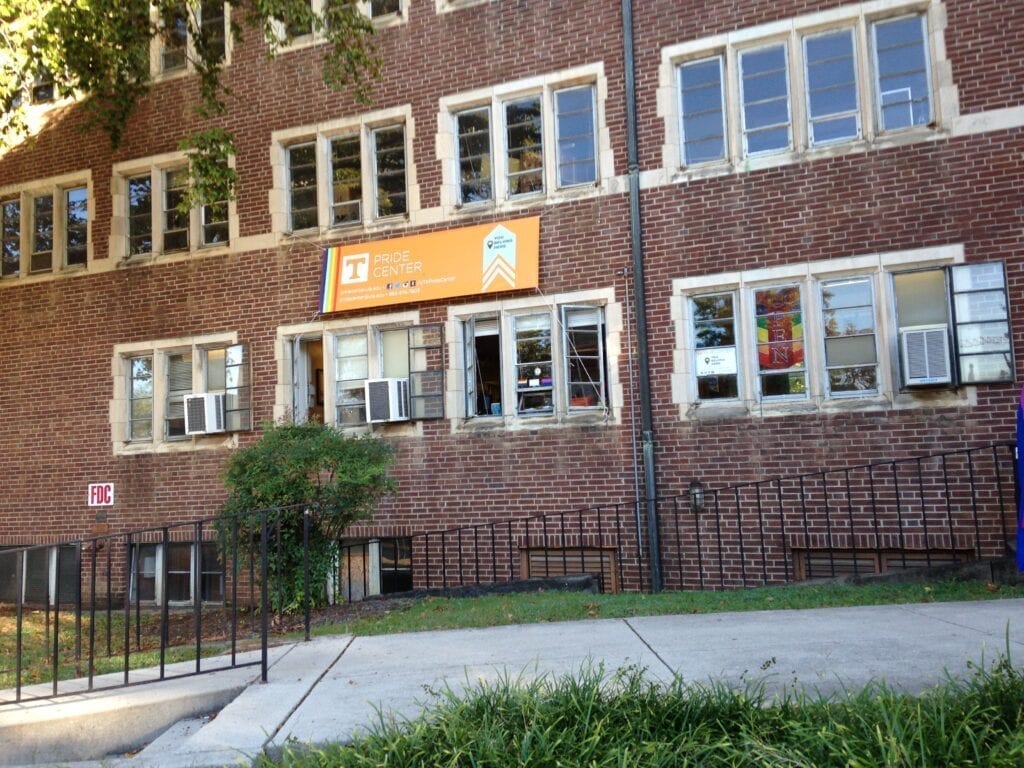Former Peace Corps volunteer shares experiences at first Pride Week
Jeremy Haber discussed his experiences as an openly gay Peace Corps volunteer in Paraguay at the inaugural Pecha Kucha event for Pride Week.

The Pride Center is located at 1616 Melrose Ave. //Photo by Taylor Owens
[title_box title=”Former Peace Corps volunteer shares experiences at first Pride Week”]
Following last week’s Diversity and Inclusion Week, the University of Tennessee’s Pride Center continued the diversity discussion with their first annual Pride Week.
The Pride Center, formerly known as the OUTreach Center, hosted its inaugural Pecha Kucha, or quick presentation of multiple speakers, on Monday, Oct. 5.
Four graduate students spoke about their areas of research in the LGBTQIA field, including Jeremy Haber, a former Peace Corps volunteer in Paraguay and current Peace Corps recruiter.
Haber said he always knew he wanted to join the organization and explore other cultures.
“I decided to apply one night, I got the interview and I instantly connected with the recruiter,” Haber said. “I never regretted it.”
Haber describes himself as an openly gay individual and said that the Peace Corps did a lot to protect volunteers from discrimination. Those who are openly gay are welcome to serve in whatever country they choose, but the Peace Corps will talk with those who have concerns and review specific cultural information, according to their official website.
“My placement officer mentioned that I chose Africa as my region to region go to, and he mentioned that there are a lot of really great countries they recommend for this community,” Haber said. “Then I knew from then on that if the Peace Corps spends that much time researching the different countries to make you feel safe, I wouldn’t have a problem.”
Haber did not speak Spanish when he left for Paraguay, but learned some through his three months of training and more during his two-year stay in the country. Despite these differences, he said the country was supportive of him and his sexuality.
“When they know you’re gay in a different country they confide in you,” Haber said. “If you’re someone from the outside they can share and connect with you right away.”
Haber said that this was especially true of the gay youth he met while working in the country who felt they could open up to him and his colleagues.
The Human Rights Campaign reports that 92 percent of LGBTQIA youth hear negative messages about their sexuality from sources like the internet, school and friends.
Junior Shannon Michel said the message of acceptance the speakers shared was important to discuss with others in order to stop negative opinions from spreading.
“I learned to be more open-minded and just come in to the community as someone willing to learn about it,” Michel said. “This can broaden peoples’ horizons and make them more aware of people outside of their comfort zone.”
Haber said he hoped people continue this dialogue after the Pecha Kucha event.
“I feel like there should just be more sharing,” Haber said. “You learn so much from these people and their passions, and I feel like we should be telling our stories more.”
More information about the Pride Center can be found on their official website.
Featured image by Taylor Owens
Edited by Jessica Carr
Arts and culture editor, Taylor Owens, recognized her passion for writing at a young age. As an avid talk show fan, Owens found journalism to be the perfect way to combine her love for interviewing and writing. She is now a sophomore at the University of Tennessee majoring in journalism and electronic media. When she isn’t writing for the Tennessee Journalist, Owens is most likely catching up on the latest reality television show.


Feel free to contact me about Peace Corps at peacecorps@utk.edu